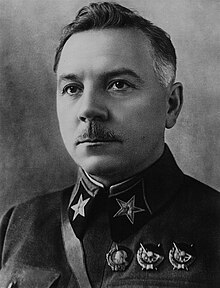The Minister of Defence of the Soviet Union (Russian: Министр обороны СССР) refers to the head of the Ministry of Defence who was responsible for defence of the socialist/communist Russian Soviet Federative Socialist Republic from 1917 to 1922 and the Soviet Union from 1922 to 1992.
| Minister of Defence of the Soviet Union | |
|---|---|
| Министр обороны СССР | |
 Standard of the Minister of Defence (1964–1991) | |
| Ministry of Defense | |
| Status | Abolished |
| Reports to | Premier |
| Nominator | Council of Defence |
| Appointer | Politburo |
| Precursor | Minister of War (Russian Empire) |
| Formation | 8 November 1917 |
| First holder | Council on War and Navy Affairs |
| Final holder | Yevgeny Shaposhnikov |
| Abolished | 14 February 1992[1] |
| Succession | Commander-in-Chief of the CIS Armed Forces (1992–1993) Minister of Defence (Russian Federation) |
People's Commissars for Military and Naval Affairs (1917–1934)
edit| No. | Portrait | People's Commissar for Military and Naval Affairs | Took office | Left office | Time in office |
|---|---|---|---|---|---|
| 1 | Council [a] | 8 November 1917 | 15 November 1917 | 7 days | |
| 2 | Nikolai Podvoisky (1880–1948) | 15 November 1917 | 13 March 1918 | 118 days | |
| 3 | Leon Trotsky (1879–1940) | 14 March 1918 | 25 January 1925 | 6 years, 317 days | |
| 4 | Mikhail Frunze (1885–1925) | 25 January 1925 | 31 October 1925 † | 279 days | |
| 5 | Kliment Voroshilov (1881–1969) | 6 November 1925 | 20 June 1934 | 8 years, 232 days |
People's Commissars for Defence (1934–1946)edit
|
People's Commissars for the Navy (1937–1946)edit
|
People's Commissar for the Armed Forces (1946)
edit| No. | Portrait | People's Commissar for the Armed Forces | Took office | Left office | Time in office |
|---|---|---|---|---|---|
| 1 | Marshal of the Soviet Union Joseph Stalin (1878–1953) | 25 February 1946 | 15 March 1946 | 18 days |
Ministers of the Armed Forces (1946–1950)
edit| No. | Portrait | Minister of the Armed Forces | Took office | Left office | Time in office |
|---|---|---|---|---|---|
| 1 | Marshal of the Soviet Union Joseph Stalin (1878–1953) | 15 March 1946 | 3 March 1947 | 353 days | |
| 2 | Marshal of the Soviet Union Nikolai Bulganin (1895–1975) | 3 March 1947 | 24 March 1949 | 2 years, 21 days | |
| 3 | Marshal of the Soviet Union Aleksandr Vasilevsky (1895–1977) | 24 March 1949 | 25 February 1950 | 338 days |
Minister of War (1950–1953)edit
|
Ministers of the Navy (1950–1953)edit
|
Ministers of Defence (1953–1992)
edit| No. | Portrait | Minister of Defence | Took office | Left office | Time in office | Leader | Premier |
|---|---|---|---|---|---|---|---|
| 1 | Marshal of the Soviet Union Nikolai Bulganin (1895–1975) | 15 March 1953 | 9 February 1955 | 1 year, 331 days | Georgy Malenkov Nikita Khrushchev | Georgy Malenkov | |
| 2 | Marshal of the Soviet Union Georgy Zhukov (1896–1974) [b] | 9 February 1955 | 26 October 1957 | 2 years, 259 days | Nikita Khrushchev | Nikolai Bulganin | |
| 3 | Marshal of the Soviet Union Rodion Malinovsky (1898–1967) | 26 October 1957 | 31 March 1967 † | 9 years, 156 days | Nikita Khrushchev Leonid Brezhnev | Nikolai Bulganin Nikita Khrushchev Alexsei Kosygin | |
| 4 | Marshal of the Soviet Union Andrei Grechko (1903–1976) | 12 April 1967 | 26 April 1976 † | 9 years, 14 days | Leonid Brezhnev | Alexsei Kosygin | |
| 5 | Marshal of the Soviet Union Dmitry Ustinov (1908–1984) | 30 July 1976 | 20 December 1984 † | 8 years, 143 days | Leonid Brezhnev Yuri Andropov Konstantin Chernenko | Alexsei Kosygin Nikolai Tikhonov | |
| 6 | Marshal of the Soviet Union Sergei Sokolov (1911–2012) [c] | 22 December 1984 | 29 May 1987 | 2 years, 158 days | Konstantin Chernenko Mikhail Gorbachev | Nikolai Tikhonov Nikolai Ryzhkov | |
| 7 | Marshal of the Soviet Union Dmitry Yazov (1924–2020) [d] | 30 May 1987 | 28 August 1991 | 4 years, 90 days | Mikhail Gorbachev | Nikolai Ryzhkov Valentin Pavlov | |
| 8 | Marshal of Aviation Yevgeny Shaposhnikov (1942–2020) [e] | 29 August 1991[2] | 14 February 1992[1] | 169 days | Mikhail Gorbachev (until Dec. 1991) | Ivan Silayev |
See also
editNotes
edit- ^ The committee of the People's Commissars for Military and Naval Affairs consisted of Vladimir Antonov-Ovseenko, Pavel Dybenko, and Nikolai Krylenko. On 10 November 1917 Ovseenko was taken hostage during the Petrograd Junker mutiny and was released next day with the help of American journalist Williams. Later Ovseenko headed the Petrograd Military District until December when he was dispatched to Ukraine. Dybenko continued to supervise the naval affairs as the Supreme Navy College that was formed sometime in late November. He stayed in charge until 16 March 1918 when he was stripped of all posts and revoked membership in the Bolshevik Party due to desertion. On 25 November 1917 Krylenko was appointed the Supreme Commander-in-Chief of the Red Army.
- ^ Dismissed by Nikita Khrushchev in the aftermath of the Anti-Party Group affair.
- ^ Dismissed by Mikhail Gorbachev as a result of the Mathias Rust affair.
- ^ Dismissed by Mikhail Gorbachev for being a member of the GKChP during the 1991 coup attempt.
- ^ On 14 February 1992, by the decision of the Council of CIS Heads of State, Marshal Yevgeny Shaposhnikov was appointed Commander-in-Chief of the United Armed Forces of the CIS.
